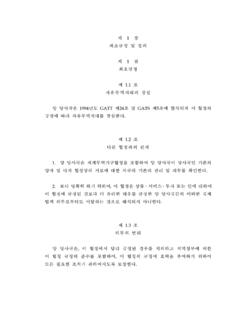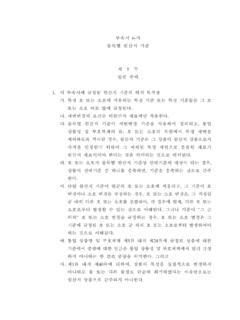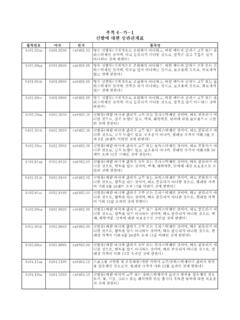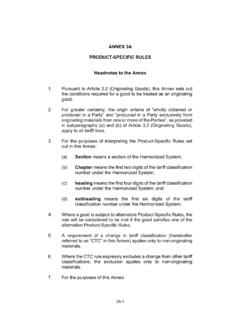Transcription of CHAPTER FOUR ORIGIN PROCEDURES - FTA 강국, …
1 CHAPTER four ORIGIN PROCEDURES ARTICLE : DEFINITIONS For the purposes of this CHAPTER : customs authority means the authority that is responsible under the law of a Party for the administration and application of customs laws and regulations; determination of ORIGIN means a determination as to whether a good qualifies as an originating good in accordance with CHAPTER Three (Rules of ORIGIN ); identical goods means goods that are same in all respects, including physical characteristics and quality, irrespective of minor differences in appearance that are not relevant to a determination of ORIGIN of those goods under CHAPTER Three (Rules of ORIGIN ); indirect materials means indirect materials as defined in Article (Definitions); materials means materials as defined in Article (Definitions); producer means producer as defined in Article (Definitions); and production means production as defined in Article (Definitions).
2 ARTICLE : ISSUING AUTHORITIES OF CERTIFICATE OF ORIGIN 1. The Certificate of ORIGIN shall be issued by the Government designated authorities (hereinafter referred to as Issuing Authorities ) of the exporting Party as provided in Annex 4-A. 2. Each Party shall inform the other Party of the names and addresses of the authorised officials of its respective Issuing Authorities and also provide the original sets of their specimen signatures and specimen of official seals. Any change in names, addresses, specimen signatures or official seals shall be promptly informed to the other Party. 3. For the purposes of verifying the requirements for preferential tariff treatment, the Issuing Authorities shall have the right to request for any supporting documentary evidence or to carry out any verification considered appropriate, consistent with its laws or practices.
3 ARTICLE : APPLICATION FOR CERTIFICATE OF ORIGIN 1. The exporter or the producer of the goods qualified for preferential tariff treatment shall apply in writing or electronically, as the case may be, to the relevant Issuing Authorities requesting for pre-export verification of the ORIGIN of the goods. The Issuing Authorities may conduct pre-export verification. The result of the verification, subject to review periodically or whenever appropriate, shall be accepted as the supporting evidence in verifying the ORIGIN of the said goods to be exported thereafter. The pre-export verification may not apply to the goods of which, by their nature, ORIGIN can be easily verified. 2. At the time of carrying out the formalities for exporting the goods under preferential tariff treatment: (a) the exporter or his or her authorised representative shall submit a written application for a Certificate of ORIGIN together with appropriate supporting documents proving that the goods to be exported qualify for the issuance of the Certificate of ORIGIN ; or (b) where an exporter is not the producer of the good, the application for a Certificate of ORIGIN may be on the basis of the producer s ORIGIN declaration that the goods qualify as originating goods, including the result of pre-export verification pursuant to paragraph 1.
4 3. The Issuing Authorities shall, to the best of their competence and ability, carry out proper examination upon each application for a Certificate of ORIGIN to ensure that: (a) the application for the Certificate of ORIGIN is duly completed and signed by the exporter or its authorised signatory; (b) the ORIGIN of the goods is in conformity with CHAPTER Three (Rules of ORIGIN ); (c) the other statements of the Certificate of ORIGIN correspond to supporting documentary evidence submitted; and (d) export of multiple items declared on a single Certificate of ORIGIN shall be allowed, provided that each item qualifies as originating separately in its own right. ARTICLE : ISSUANCE OF A CERTIFICATE OF ORIGIN 1.
5 A Certificate of ORIGIN shall: (a) be in a printed format or such other medium including electronic format; (b) be completed in English in conformity with the specimen and the instructions contained therein as set out in the Annex 4-B; and (c) comprise one original and three copies. 2. The Issuing Authorities, while retaining the duplicate, shall provide the original and remaining two copies to the exporter. The original shall be forwarded, together with the triplicate, by the exporter to the importer for submission to the customs authority at the port or place of importation. The triplicate shall be retained by the importer. The quadruplicate shall be retained by the exporter. 3.
6 No erasures and superimpositions shall be allowed on the Certificate of ORIGIN . Any alteration shall be made by striking out the errors and making any addition required. Such alterations shall be approved and certified by an official authorised to sign the Certificate of ORIGIN issued by the relevant Issuing Authorities. Unused spaces shall be crossed out to prevent any subsequent addition. 4. The Certificate of ORIGIN shall be issued at the time of exportation, or within seven working days from the date of shipment whenever the goods to be exported can be considered originating in that Party. Under exceptional cases where a Certificate of ORIGIN has not been issued at the time of exportation or within seven working days from the date of shipment due to involuntary errors or omissions, or any other valid reasons, the Certificate of ORIGIN may be issued retrospectively but not later than one year from the date of shipment, bearing the words ISSUED RETROSPECTIVELY in Remarks box of the Certificate of ORIGIN .
7 5. In the event of theft, loss or destruction of a Certificate of ORIGIN , the exporter may apply in writing to the Issuing Authorities which issued it for a certified true copy of the original and the triplicate to be made on the basis of the export documents in their possession bearing the endorsement of the words CERTIFIED TRUE COPY , (in lieu of the original certificate) in Remarks box of the Certificate of ORIGIN . This copy shall bear the date of the original Certificate of ORIGIN . The certified true copy of a Certificate of ORIGIN shall be issued not later than one year from the date of issuance of the original Certificate of ORIGIN and on the condition that the exporter provides to the relevant Issuing Authorities the quadruplicate.
8 ARTICLE : VALIDITY OF CERTIFICATE OF ORIGIN 1. A Certificate of ORIGIN shall be valid for 12 months from the date of issue in the exporting Party, and the claim for preferential tariff treatment shall be made within the said period to the customs authority of the importing Party. 2. A Certificate of ORIGIN , which is submitted to the customs authority of the importing Party after the said expiration date specified in paragraph 1, may be accepted for the purpose of claiming preferential tariff treatment, in accordance with the PROCEDURES applicable in that Party where the failure to submit these documents by the final date is due to exceptional circumstances. 3. In all cases, the customs authority in the importing Party may accept such Certificate of ORIGIN , provided that the goods have been imported before the expiration date of the said Certificate of ORIGIN in accordance with the PROCEDURES applicable in that Party.
9 4. A single Certificate of ORIGIN may be used for: (a) a single shipment of goods that results in the filing of one or more entries on the importation of the goods into the territory of a Party; or (b) more than one shipment of goods that results in the filing of one entry on the importation of the goods into the territory of a Party. ARTICLE : INVOICING BY A NON-PARTY OPERATOR 1. The customs authority in the importing Party may accept a Certificate of ORIGIN in cases where the sales invoice is issued by an operator located in a third country or by an exporter for the account of the said operator, provided that the good meets the requirements of CHAPTER Three (Rules of ORIGIN ). 2. The exporter of the goods shall indicate third country invoicing and such information as name, address and country of the operator issuing the invoice in the Certificate of ORIGIN .
10 ARTICLE : DISCREPANCIES IN THE CERTIFICATE OF ORIGIN The discovery of minor discrepancies between the statements made in the Certificate of ORIGIN and those made in the documents submitted to the customs authority of the importing Party for the purpose of carrying out the formalities for importing the goods shall not ipso facto invalidate the Certificate of ORIGIN , if it does in fact correspond to the said goods. ARTICLE : CLAIMS FOR PREFERENTIAL TARIFF TREATMENT 1. Except as otherwise provided for in this CHAPTER , each Party shall require an importer in its territory that claims preferential tariff treatment for a good imported into its territory from the territory of the other Party to: (a) request preferential tariff treatment at the time of importation of an originating good, if required by the customs authority of the importing Party; (b) make a written declaration, if it deems necessary, that the good qualifies as an originating good; (c) submit the original Certificate of ORIGIN to the customs authority of the importing Party at the time of importation, if required by the customs authority of the importing Party.
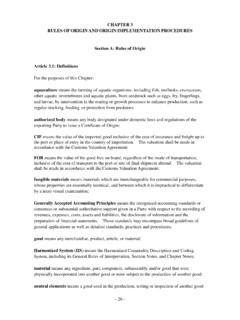
![[별표 16] 유럽자유무역연합회원국과의 협정에 따른 …](/cache/preview/5/c/2/a/6/3/3/f/thumb-5c2a633f5cc70cb25bb83dab4a152e22.jpg)
